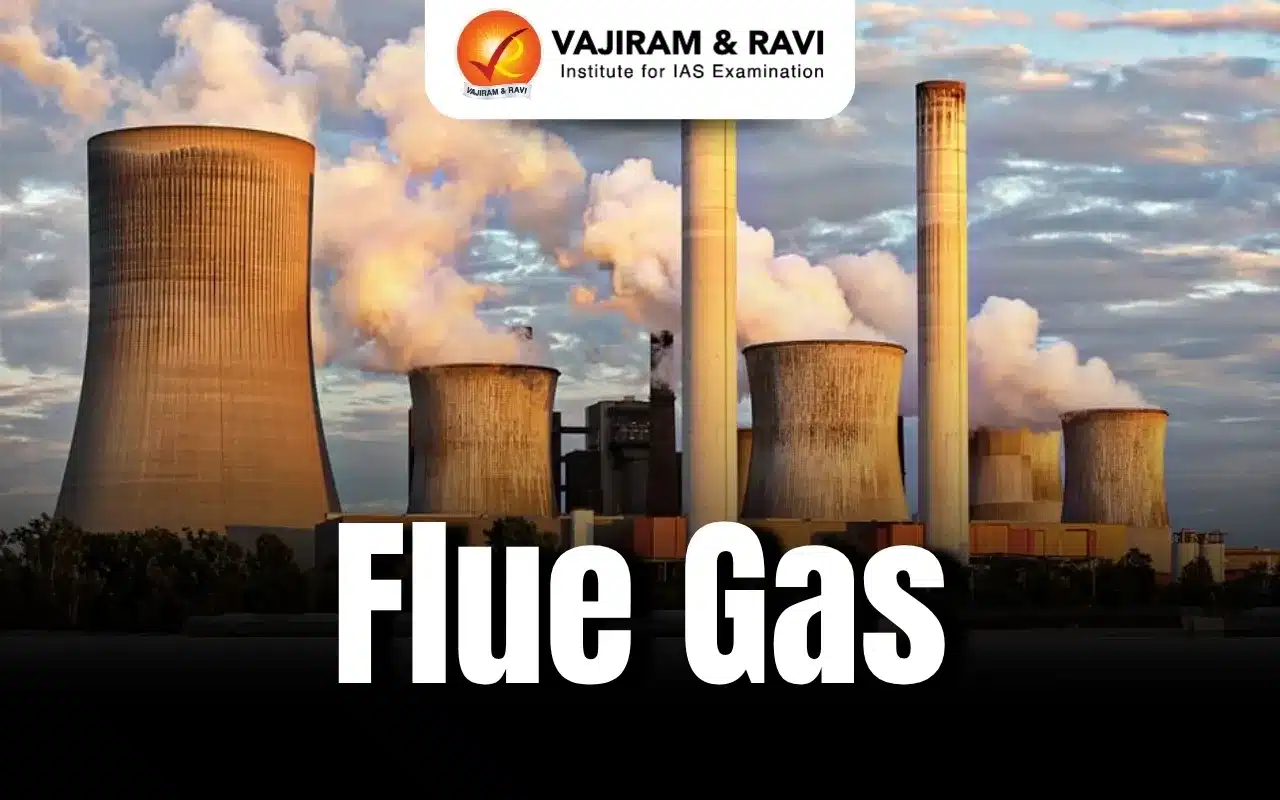Flue Gas Desulphurisation India Latest News
- A high-powered committee led by Principal Scientific Advisor Ajay Sood has recommended scrapping the decade-old policy requiring Flue Gas Desulphurisation (FGD) units in all coal-fired thermal power plants.
- The panel concluded that FGDs may no longer be necessary, marking a potential shift in India’s pollution control strategy.
- The Environment Ministry is currently reviewing the committee’s recommendation. A final decision will be made by the Power and Environment Ministries.
Flue Gas Desulphurisation (FGD)
- FGD is a technology used to remove sulphur dioxide (SO₂) from the exhaust (flue) gases emitted by coal-fired power plants, industrial boilers, and other combustion sources.
Working
- When coal is burned, it releases sulphur dioxide (SO₂), which is harmful to human health and contributes to acid rain.
- FGD systems scrub these gases, typically using a slurry of limestone (calcium carbonate) or lime (calcium oxide).
- The SO₂ reacts with the slurry to form gypsum (calcium sulphate), a by-product that can be used in construction.
Current Compliance
- FGD units are required to be retro-fitted in TPPs to cut harmful sulphur dioxide (SO2) emissions.
- India has 180 coal-fired thermal power plants, each of them with multiple units.
- The 600 TPPs, depending on their size, age, proximity to densely populous cities, and background pollution levels, were given different timelines by the Environment Ministry to comply with the FGD installation requirements.
- Deadlines have been shifted three times, with the most recent extension coming on Dec 31, 2024.
- 92% of India’s 600 thermal power plants (TPPs) units have not installed FGDs.
- In theory, the costs of non-compliance could run to crores of rupees in fines, though these have not materialised thanks to deadline extensions.
Reasons for Historical Non-Compliance
- High costs and limited vendor availability.
- Potential rise in electricity tariffs.
- COVID-19 delays.
- Despite missing deadlines, penalties were avoided due to repeated deadline extensions.
Committee Recommends Scrapping FGD Mandate
- A high-powered expert committee led by Principal Scientific Advisor Ajay Sood has advised ending the mandatory installation of Flue Gas Desulphurisation (FGD) units in coal-fired thermal power plants (TPPs).
Basis of Recommendation
- SO₂ Levels Already Low
- The committee cited findings from CSIR-NEERI, IIT Delhi, and NIAS, supported by:
- Low ambient SO₂ levels (10–20 µg/m³ vs. the permissible 80 µg/m³).
- Low sulphur content in Indian coal.
- Negligible difference in SO₂ levels near TPPs with or without FGDs.
- Low sulphur content in PM samples across India.
- The committee cited findings from CSIR-NEERI, IIT Delhi, and NIAS, supported by:
- FGDs Could Increase CO₂ Emissions
- Installing FGDs in all TPPs by 2030 could lead to:
- An additional 69 million tonnes of CO₂ emissions, while only reducing SO₂ by 17 million tonnes.
- The committee argued that removing short-lived SO₂ while adding long-lived CO₂ could worsen global warming.
- Installing FGDs in all TPPs by 2030 could lead to:
- Public Health Not at Risk
- The committee concluded:
- FGDs not essential for meeting National Ambient Air Quality (NAAQ) standards.
- TPPs should still comply with 2015 norms on particulate matter and water use.
- Relaxing SO₂ norms would not compromise public health if ambient standards are met.
- The committee concluded:
Concerns
- Experts pointed out that burning coal is India’s primary source of electricity.
- As a result, India’s annual SO2 emissions has risen from 4,000 kilotonnes in 2010 to 6,000 kilotonnes in 2022.
- In contrast, Indonesia averaged only 2,000 kt over the same period, even though India imports coal from there.
- This is despite India’s strict SO₂ emission standard of 100 µg/m³ (compared to Indonesia’s 800 µg/m³).
Proposed Plant Classification and Compliance
- The committee recommends a tiered approach:
- Category A: TPPs within 10 km of NCR or million-plus cities (66 plants) must install FGDs; only 14 have done so.
- Currently, all these plants are required to comply by 2027.
- Category B: Plants near critically polluted or non-attainment cities (72 plants) may get case-by-case exemptions.
- These plants currently have a deadline of 2028.
- Category C: The remaining 462 plants should be completely exempted.
- These plants were given a 2029 deadline.
- The committee has now recommended that Category C plants be exempted completely, along with some units in Categories A and B which were set up at least 20 years ago.
- Category A: TPPs within 10 km of NCR or million-plus cities (66 plants) must install FGDs; only 14 have done so.
Flue Gas Desulphurisation India FAQs
Q1. What is Flue Gas Desulphurisation (FGD)?
Ans. FGD is a technology to remove SO₂ from coal plant emissions using limestone slurry, producing gypsum as by-product.
Q2. Why is FGD no longer considered necessary?
Ans. Experts found India’s SO₂ levels are already below air quality limits; FGDs add CO₂ and increase costs.
Q3. How many thermal plants currently have FGDs?
Ans. Only about 8% of 600 coal plant units have installed FGDs despite long-standing mandates and shifting deadlines.
Q4. What classification has been proposed for plants?
Ans. Plants are categorized (A, B, C); only Category A (urban proximity) must comply, others may be exempt.
Q5. Will dropping FGD affect public health?
Ans. No, studies show ambient SO₂ levels are within limits; SO₂ stack norms may be relaxed without harming health.
Last updated on June, 2025
→ UPSC Notification 2025 was released on 22nd January 2025.
→ UPSC Prelims Result 2025 is out now for the CSE held on 25 May 2025.
→ UPSC Prelims Question Paper 2025 and Unofficial Prelims Answer Key 2025 are available now.
→ UPSC Calendar 2026 is released on 15th May, 2025.
→ The UPSC Vacancy 2025 were released 1129, out of which 979 were for UPSC CSE and remaining 150 are for UPSC IFoS.
→ UPSC Mains 2025 will be conducted on 22nd August 2025.
→ UPSC Prelims 2026 will be conducted on 24th May, 2026 & UPSC Mains 2026 will be conducted on 21st August 2026.
→ The UPSC Selection Process is of 3 stages-Prelims, Mains and Interview.
→ UPSC Result 2024 is released with latest UPSC Marksheet 2024. Check Now!
→ UPSC Toppers List 2024 is released now. Shakti Dubey is UPSC AIR 1 2024 Topper.
→ Also check Best IAS Coaching in Delhi
Tags: flue gas desulphurisation india mains articles upsc current affairs upsc mains current affairs
























